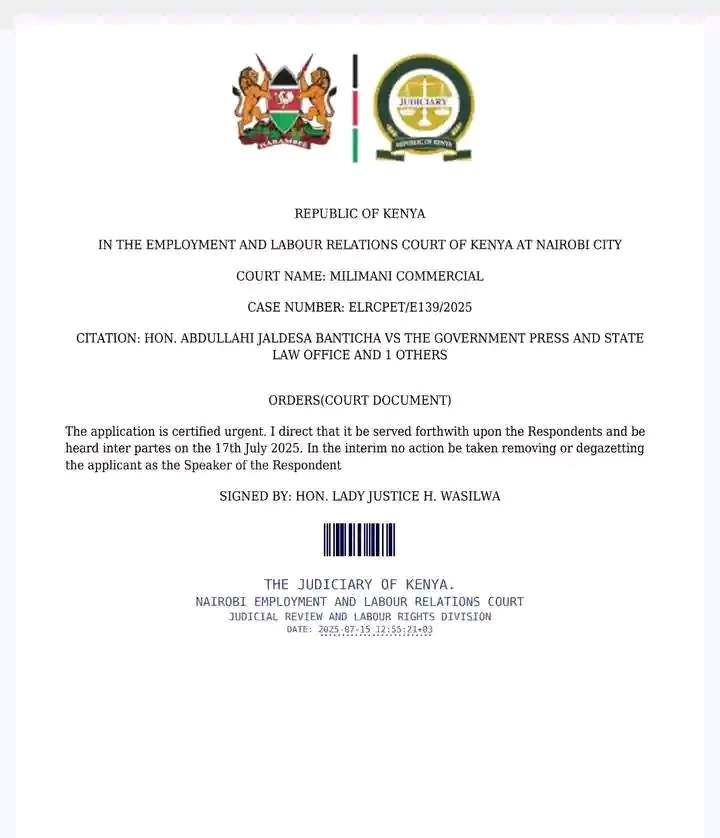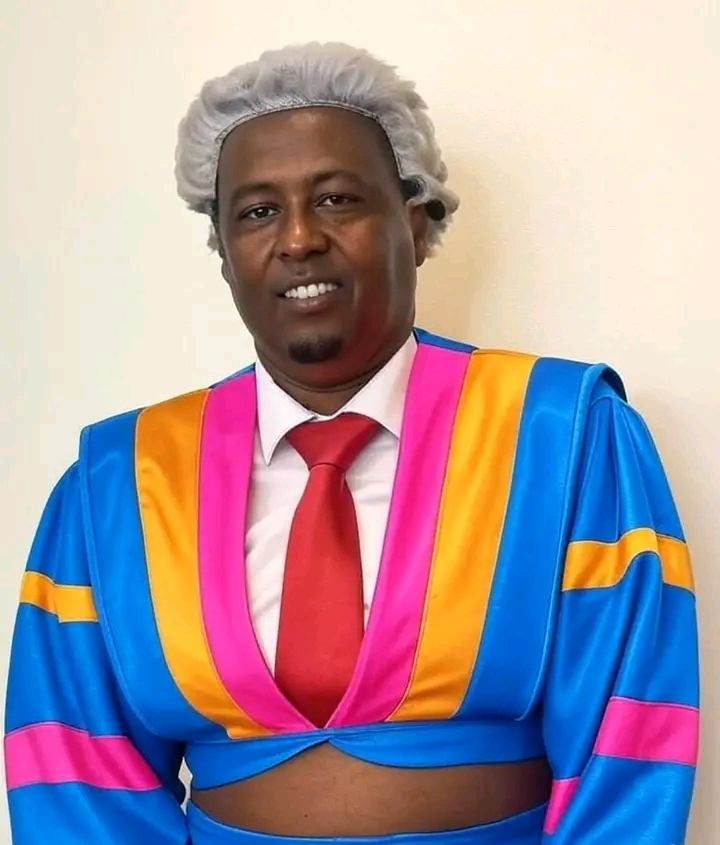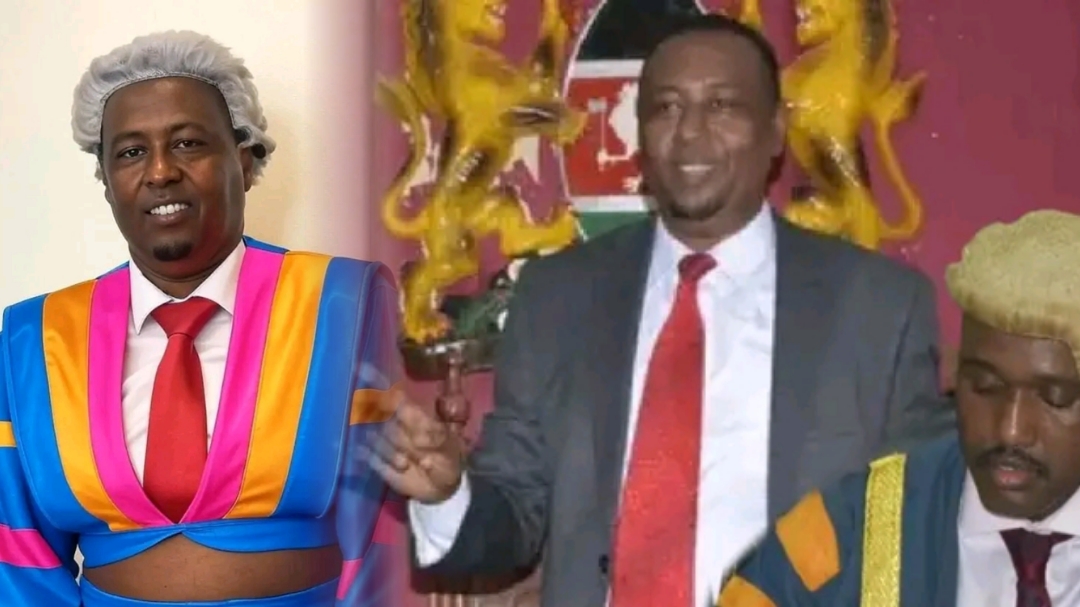In a dramatic escalation of the leadership crisis gripping Isiolo County, the High Court in Nairobi has issued temporary conservatory orders halting the removal of newly appointed County Assembly Speaker Abdullahi Jaldesa Banticha.
The ruling, delivered by Justice Hellen Wasilwa of the Employment and Labour Relations Court on July 15, 2025, bars any attempts to degazette or oust Banticha pending the hearing and determination of a petition he filed against the Government Press and the State Law Office.
This judicial intervention has thrust the spotlight on a deepening power struggle within the Isiolo County Assembly, where competing factions, rival speakers, and dueling clerks have plunged the devolved unit into institutional paralysis.
A Tangled Web of Leadership Disputes
The roots of this crisis trace back to a contentious power struggle that has polarized the Isiolo County Assembly, creating an unprecedented scenario where two speakers and two clerks claim legitimacy.

Abdullahi Jaldesa Banticha, a former Member of Parliament for Isiolo South (2013–2017), was gazetted as the new Speaker on June 26, 2025, replacing Mohamed Roba, who had presided over a controversial and ultimately unsuccessful impeachment motion against Isiolo Governor Abdi Guyo.
The gazette notice, signed by Assembly Clerk Salad Guracha, declared Banticha as the duly elected Speaker and Chairperson of the Isiolo County Assembly Service Board.
However, the situation took a chaotic turn when Guracha, who had been suspended by Roba and replaced by acting clerk Yussuf Hajj, revoked Banticha’s appointment in a fresh gazette notice on July 14, 2025.
Guracha’s reinstatement by a court order further complicated the leadership matrix, as his actions were challenged by a group of 16 MCAs who dismissed the gazettement of Banticha as unlawful, asserting that no formal Assembly sitting had taken place to elect him.
Isiolo Senator Fatuma Dullo intensified the controversy during Senate deliberations, revealing that Banticha’s election was allegedly supported by only two MCAs, raising serious questions about its legitimacy and the role of the Government Printer in gazetting the appointment.
Court Steps In to Stem the Tide
Faced with the threat of being ousted, Banticha swiftly moved to the Labour and Relations Court, seeking to quash the revocation of his gazettement.
In his petition, he named the Government Press and the State Law Office as respondents, arguing that the attempt to degazette him was illegal and procedurally flawed.
Justice Wasilwa certified the petition as urgent, issuing conservatory orders to maintain the status quo and directing that all respondents be served ahead of an inter partes hearing scheduled for July 17, 2025.
The court’s intervention underscores the judiciary’s critical role in resolving the escalating leadership standoff, which has drawn national attention due to its implications for devolved governance.
The High Court’s ruling follows a separate decision on July 11, 2025, by Justice Bahati Mwamuye, who declined to lift the gazette notice appointing Banticha, rejecting a petition by activists under Operation Linda Jamii.
The group had sought to suspend Banticha’s appointment and bar him from assuming the Speaker’s office, but the court directed all parties to file responses by July 16, 2025, with a mention set for August 11, 2025.

These judicial developments highlight the complex legal battles now shaping the leadership dynamics in Isiolo.
A County in Crisis: Two Speakers, Two Clerks
The leadership turmoil in Isiolo County Assembly has reached unprecedented levels, with the county now operating with two rival speakers—Banticha and Roba—and two competing clerks—Guracha and Hajj—each claiming legal and procedural legitimacy.
This extraordinary situation came to light during Senate debates on the failed impeachment of Governor Abdi Guyo, which was nullified by the High Court in Meru on June 27, 2025, for defying conservatory orders.
The impeachment saga, backed by 16 of the 18 MCAs, exposed deep divisions between the county executive and the Assembly, with Roba accused of contempt of court for proceeding with the motion.
The fallout has left the Assembly in disarray, with reports of vandalized offices, broken furniture, and a damaged Hansard system, reflecting the chaos that erupted following the impeachment attempt.
According to Roba, the violence was intended to intimidate MCAs supporting the ouster of Governor Guyo.
The physical and institutional damage has stalled critical county functions, leaving residents anxious about the future of governance in Isiolo.
Political Implications and Calls for Stability
The crisis has drawn sharp criticism from national leaders, with Senate Speaker Amason Kingi urging Governor Guyo to mend ties with dissenting legislators and restore unity.
“This is not a win, and the Senate does not expect you to go out there chest-thumping,” Kingi cautioned, emphasizing the need for reconciliation to prevent further instability.
Senator Fatuma Dullo called for a comprehensive audit of the Assembly’s leadership processes, questioning the Government Printer’s role in gazetting a speaker elected by a mere two MCAs.
Governance experts have also warned that the unchecked abuse of impeachment powers and leadership disputes undermines Kenya’s devolution framework, with similar turmoil reported in counties like Taita Taveta and Kericho.
Governor Guyo, who survived the impeachment attempt, has extended an olive branch to his rivals, calling for unity and a focus on development.
In a statement following Banticha’s appointment, Guyo congratulated the new Speaker, urging him to lead with “diligence, fairness, and a deep commitment to the people.”
Banticha, in turn, has vowed to restore order, promising unbiased leadership and collaboration with the County Commissioner’s office to address security concerns.
During a visit to the vandalized Assembly premises on July 11, 2025, he reaffirmed his commitment to legislative oversight and service delivery, urging MCAs to resume their duties after nearly a month of disruption.
A Community in Waiting
As the July 17, 2025, court hearing approaches, Isiolo residents are watching anxiously, hoping for a resolution that will bring stability and refocus the county’s leadership on development.
The ongoing power struggle has not only paralyzed the Assembly but also raised broader questions about the integrity of devolved governance in Kenya.
With the judiciary now tasked with untangling this complex web of legal and political disputes, the outcome of Banticha’s petition could set a precedent for handling similar crises in other counties.
The situation in Isiolo underscores the fragility of county governance when political rivalries and institutional weaknesses collide.
As the Assembly grapples with its dual leadership conundrum, the people of Isiolo await a resolution that prioritizes their aspirations for progress, transparency, and accountability.
For now, the High Court’s temporary orders have provided a brief respite, but the path to lasting stability remains uncertain.





